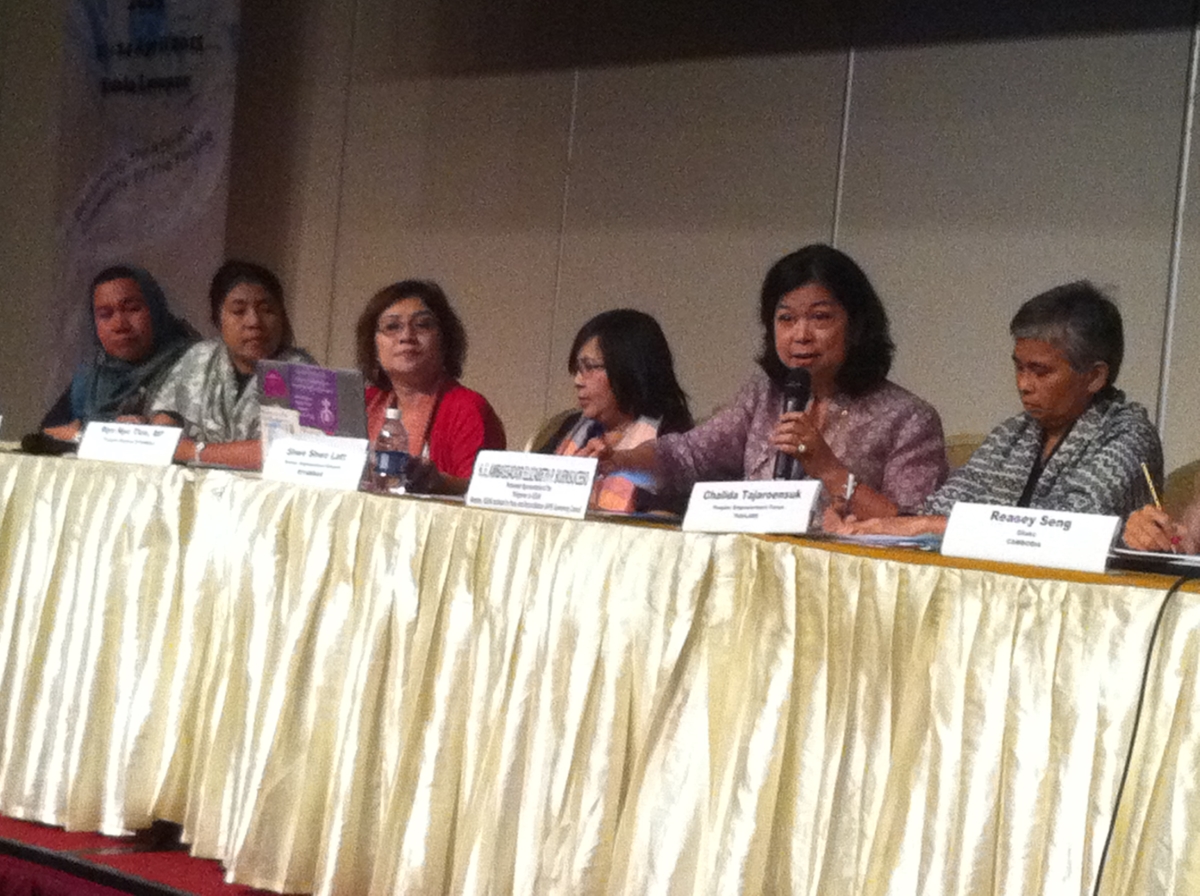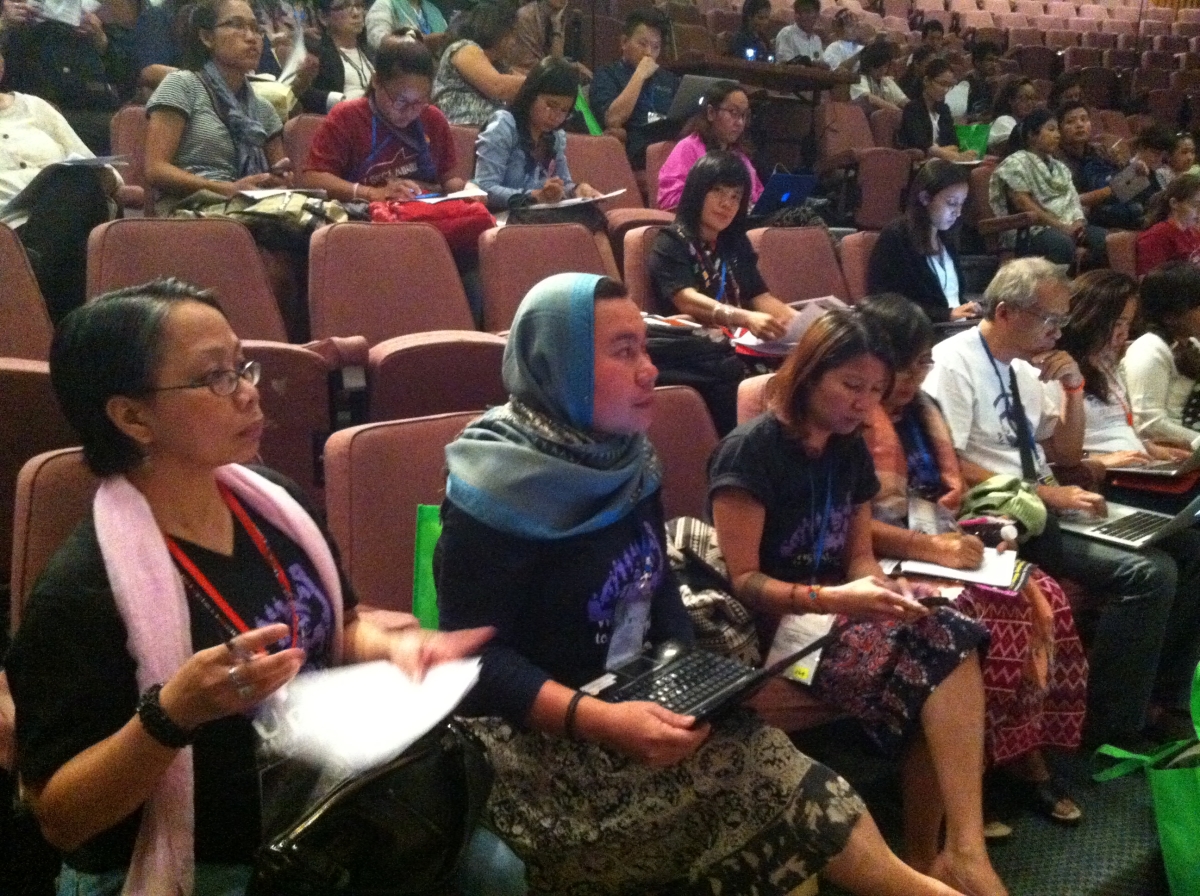Philippine Permanent Representative to ASEAN Elizabeth P. Buensuceso joined other women leaders from ASEAN in discussing the topic, “Creating Spaces, Building Partnerships: Strengthening Women’s Political Participation in Conflict and Post-Conflict Situations in ASEAN”, organized by the ASEAN People’s Forum back-to-back with the 26th ASEAN Summit in Kuala Lumpur, Malaysia on 23-25 April 2015.

Ambassador Elizabeth P. Buensuceso, Philippine Representative to the Governing Council of the ASEAN Institute on Peace and Reconciliation (AIPR), speaks at the ASEAN People’s Forum in Kuala Lumpur.
Discussions during the activity centered on partnerships between women peace builders and other stakeholders to ensure the right of women to meaningfully participate in decision-making in peace processes and democratic governance in Southeast Asian countries, particularly in relation to the United Nations Security Council (UNSC) Resolution no. 1325 on Women, Peace and Security and CEDAW General Recommendation no. 30 on Women in Conflict Prevention, Conflict and Post-Conflict Situations.

CSO representatives from various ASEAN Member States listen to speakers from Myanmar, the Philippines, Indonesia, Thailand, Cambodia, and Timor-Leste on the various contexts in which they operate.
Ambassador Buensuceso spoke on the role and mandate of AIPR as an ASEAN vehicle to help build a culture of peace and provide a platform for women to be involved in various roles , as negotiators, mediators, facilitators, capacity builders, etc, in peace processes and conflict resolution. She outlined the activities already undertaken by AIPR so far since its operationalization in 2013, including two forums organized by her Mission, and the need for collaboration between AIPR and civil society organizations such as the Initiative for International Dialogue (IID)/Global Partnership for the Prevention of Armed Conflict-Southeast Asia (GPPAC-SEA), organizers of the Forum. She noted the important roles that women play in peace processes and conflict resolution and why the world needs women peace builders and peace keepers.
She presented the outcomes of the ASEAN Institute on Peace and Reconciliation (AIPR) Workshop on Women’s Participation in Peace Processes and Conflict Resolution,which her Mission organized in Cebu City on 18-19 March 2015. She encouraged the Forum to get actively involved in translating the recommendations of the Workshop into actual activities and projects. Among these recommendations include the possible establishment of a networking of women peace practitioners in ASEAN, developing training modules for mediators, negotiators, and facilitators, building a peace knowledge hub, assisting member states to develop their respective national Action Plans in relation to UNSCR 1325, and developing a pool of think tanks to assist the AIPR. In reply to a question on how governments could be influenced to appoint more women negotiators or mediators in peace processes and conflict resolution, Ambassador Buensuceso emphasized that building the capacity of women peace mediators and negotiators is a key step in this process. She also encouraged civil society participants at the Forum to use the AIPR as a platform in highlighting women’s participation issues in their respective countries and suggested that they develop projects that may be considered by AIPR for implementation, which participants welcomed.
The ASEAN People’s Forum brought together Civil Society Organization (CSO) representatives from ASEAN Member States and Timor-Leste. The event was held just prior to the 26th ASEAN Summit. Other speakers in the Forum included Shwe Shwe Sein Latt of the Women’s Organisations Network of Myanmar, MP Nyo Nyo Thin also of Myanmar, Dayang Karna Bahidjan of Nissa Ul Haqq Fi and We Act 1325, Chalida Tajaroensuk of the People’s Empowerment Forum of Thailand, Nur Djuli of the League of Aceh Women, Prok Vanny of the Working Group for Peace of Cambodia, Reasey Seng of Silaka, and Isabel Maria Marcal Sequeira of the Network for Women of Timor-Leste, who spoke on the issues and challenges confronting women in their respective countries.

